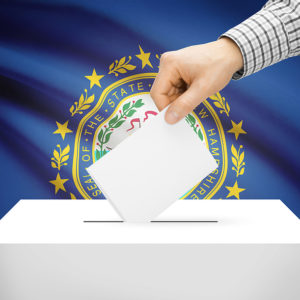Editor’s Note: For another viewpoint, see Counterpoint: No to Election Day Holiday
Americans should have options to vote in a secure and accessible way. One possibility many have raised is making Election Day a national federal holiday. While giving Americans a day devoted to voting is a good idea, it must also be coupled with other election reforms to make sure no one is left out of the political process.
The fact that we hold elections on Tuesdays, when many people are at work or in school, is a problem for too many voters. A 2017 Pew study found that nearly 16 percent of registered voters who did not vote in the 2016 election reported that they did not cast a ballot because of being too busy, a conflicting schedule, or inconvenient hours or polling places. Sixteen percent may not seem like a lot, but it represents tens-of-millions of potential voters who were not able to make their voice heard because of the timing of the election.
Making Election Day a holiday is not a new idea. In fact, many companies have already started to give their employees Election Day off, including Best Buy, Gap, Nike and Visa.
Not only would making Election Day a federal holiday give more people the freedom to vote, it would also make the practice of voting more of celebration as well as a responsibility. After all, our ability to choose the future for our families, our communities and our country through our vote is something to be celebrated. It could also help with poll worker shortages, as more people would have free time to volunteer or work at the polls.
But we also cannot ignore the challenges and unintended consequences of creating a new federal Election Day holiday. First, many frontline workers do not get federal holidays off work and likely would not get Election Day off even if it is a national holiday. That includes many low-income workers in the service and restaurant industry.
A recent report from Restaurant Opportunities Centers United found that people of color and women make up a disproportionate percentage of low-paying restaurant jobs. People of color and low-income Americans already face several barriers to vote, and making Election Day a national holiday may not help them.
Many Americans are not aware of it, but there is a law requiring that employers give their employees time off to vote. Regardless of that law, voting is a hardship for many Americans.
Low-wage earners often cannot afford to take time off work to vote. Many work multiple jobs so no one job would be covered by the law. Employees in the service sector often have little recourse if their employer doesn’t want to let people off to vote because the law is not generally enforced.
It’s just not restaurant and service industry workers who may be left out of this holiday. Several other types of employers, including hospitals, retail stores and manufacturing companies often stay open on federal holidays. Plus, child care services and public transportation may be limited or not offered on public holidays.
That poses a big problem for seniors, students and people with disabilities who rely on public transportation to travel to their polling places. People with disabilities already face many challenges in order to vote, and limiting public transit options would only compound their difficulties.
Ultimately, if we are going to make Election Day a federal holiday, we must also expand other voting opportunities, such as early voting and voting by mail, at the same time to make sure no one is left out and everyone has a chance to make their voice heard. A number of states do not offer early voting or no-excuse absentee ballots.
Extended nationwide early voting, either by mail or in person, would actually make it more convenient for more Americans to vote than a national holiday would.
We also know that many people report they don’t vote because of registration problems, so passing reforms that modernize and secure the voter registration process is also key to increasing political participation opportunities for all Americans.
These reforms include automatically registering eligible voters when they interact with a government agency, letting people register to vote online through a secure portal, and allowing people to register to vote on Election Day.
When it comes to strengthening our democracy and including more people in the political process, there is no one silver bullet reform. Instead, we have to focus on creating a voter-centric system to achieve our ultimate goal: fair, accessible and secure elections for all eligible voters.

